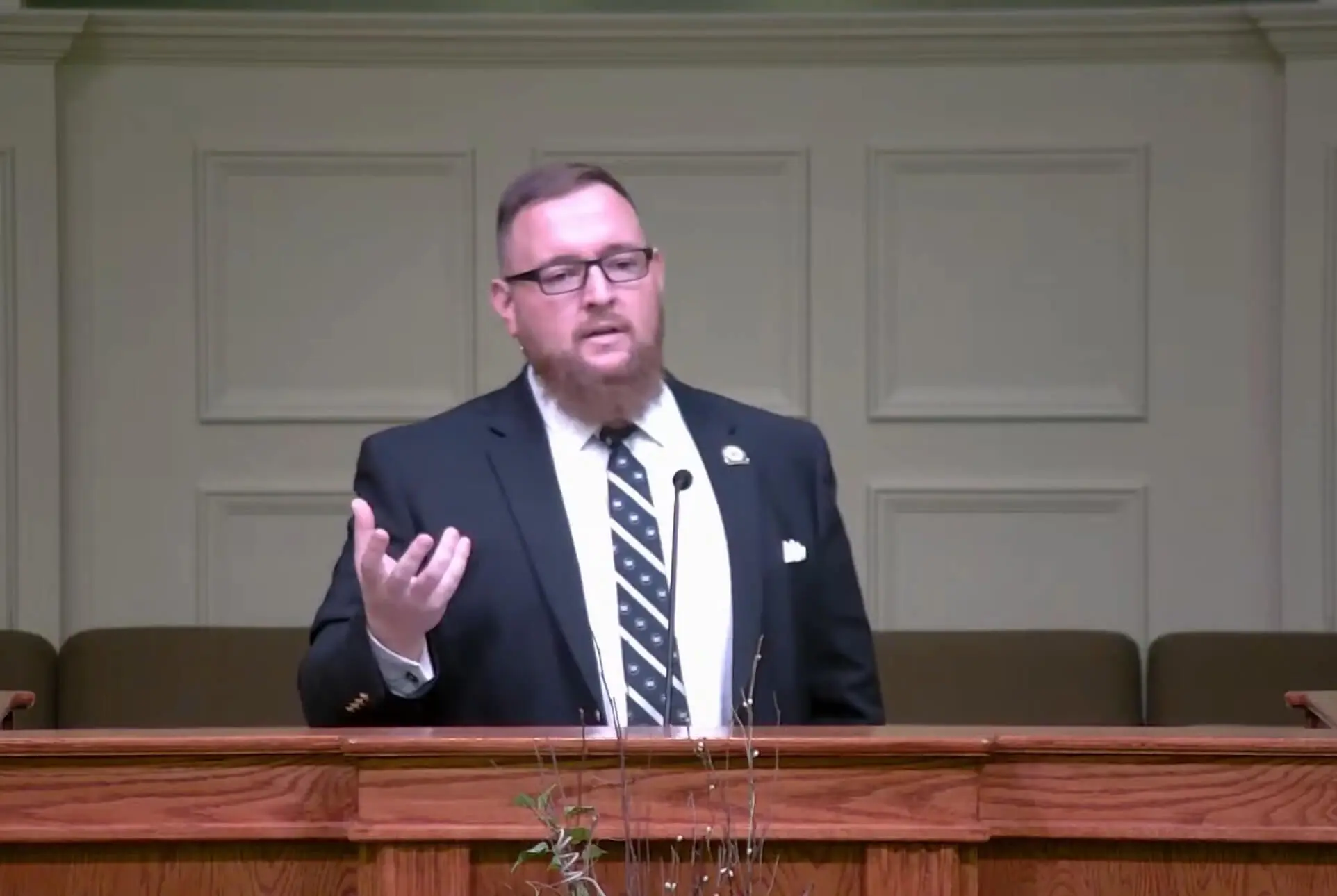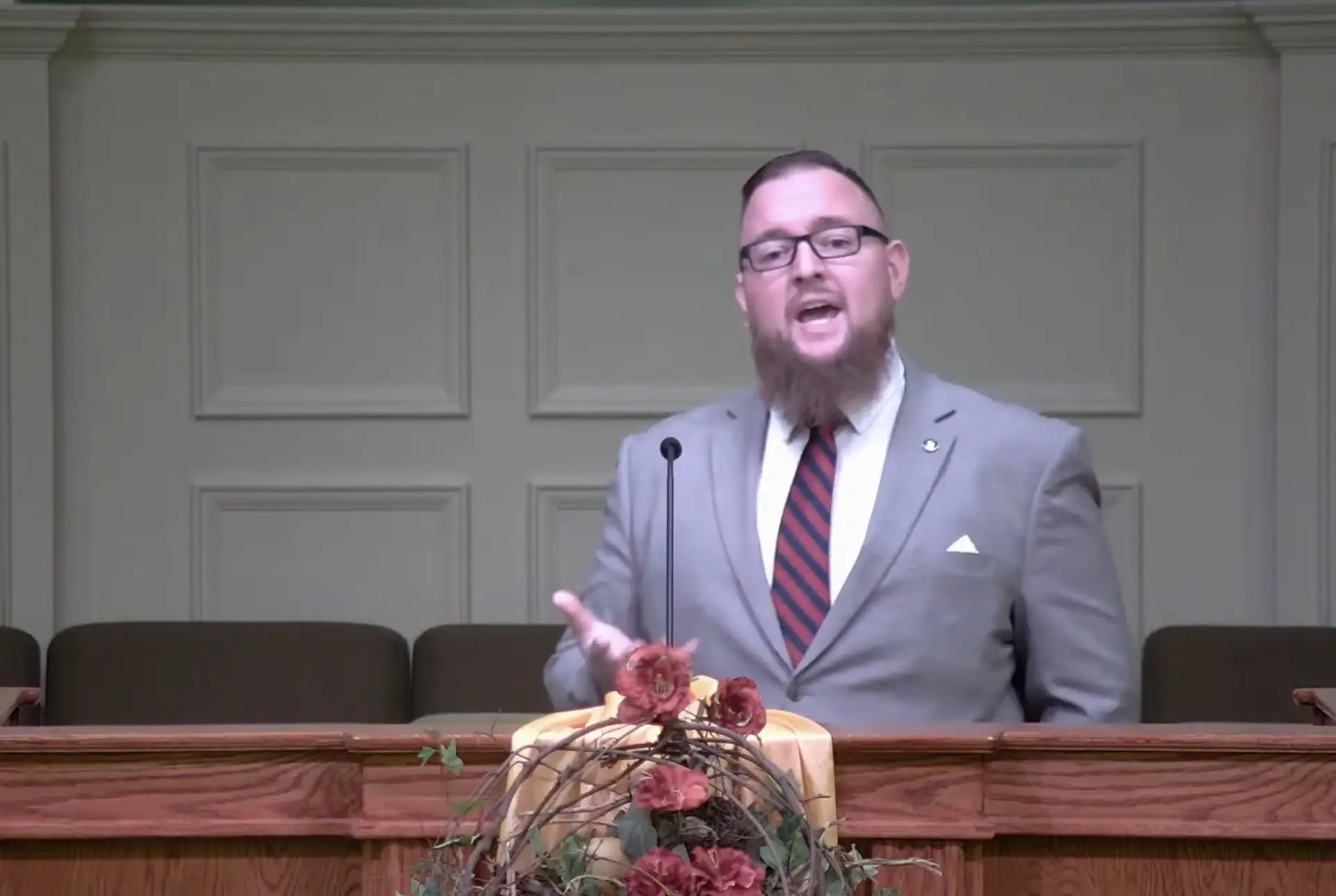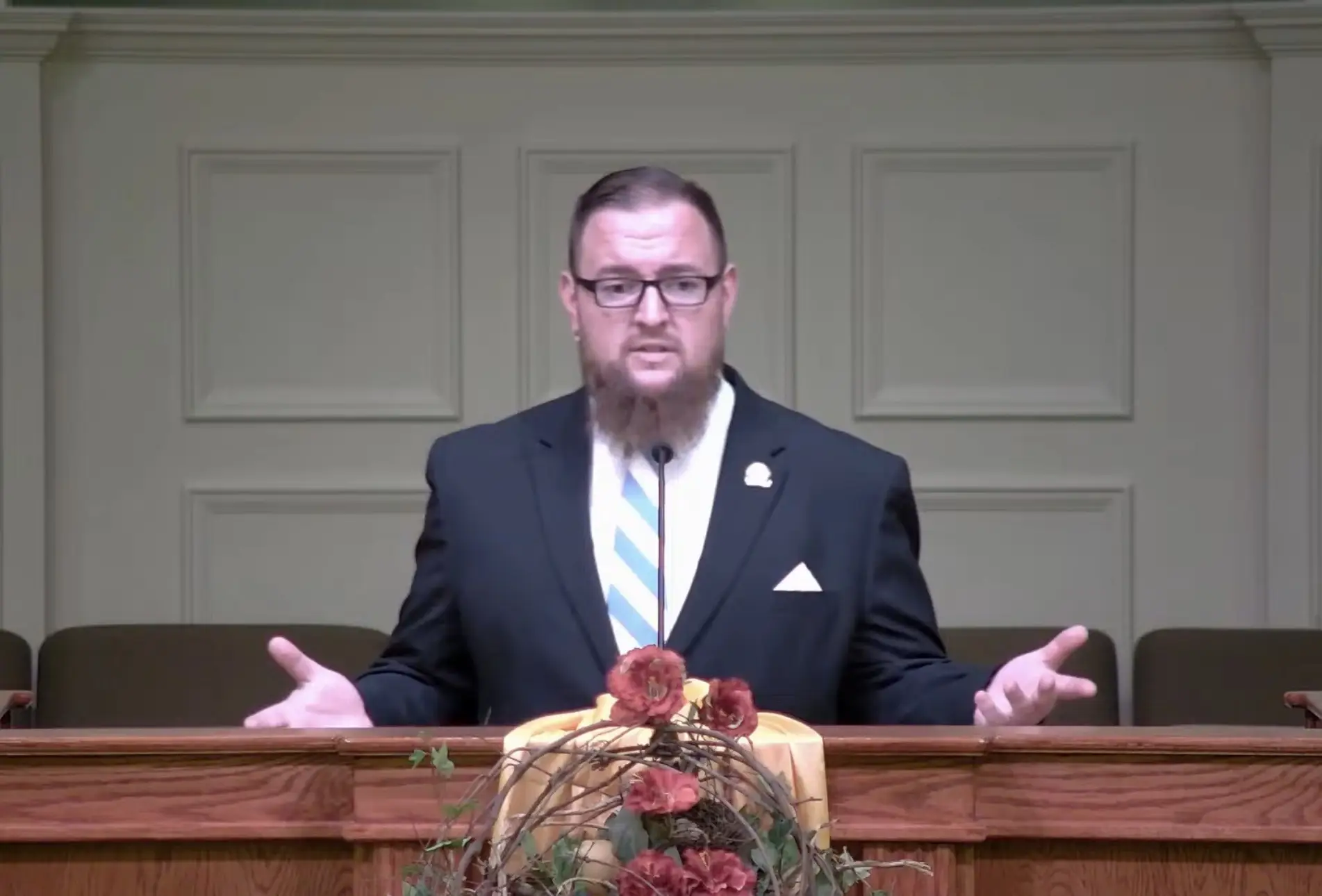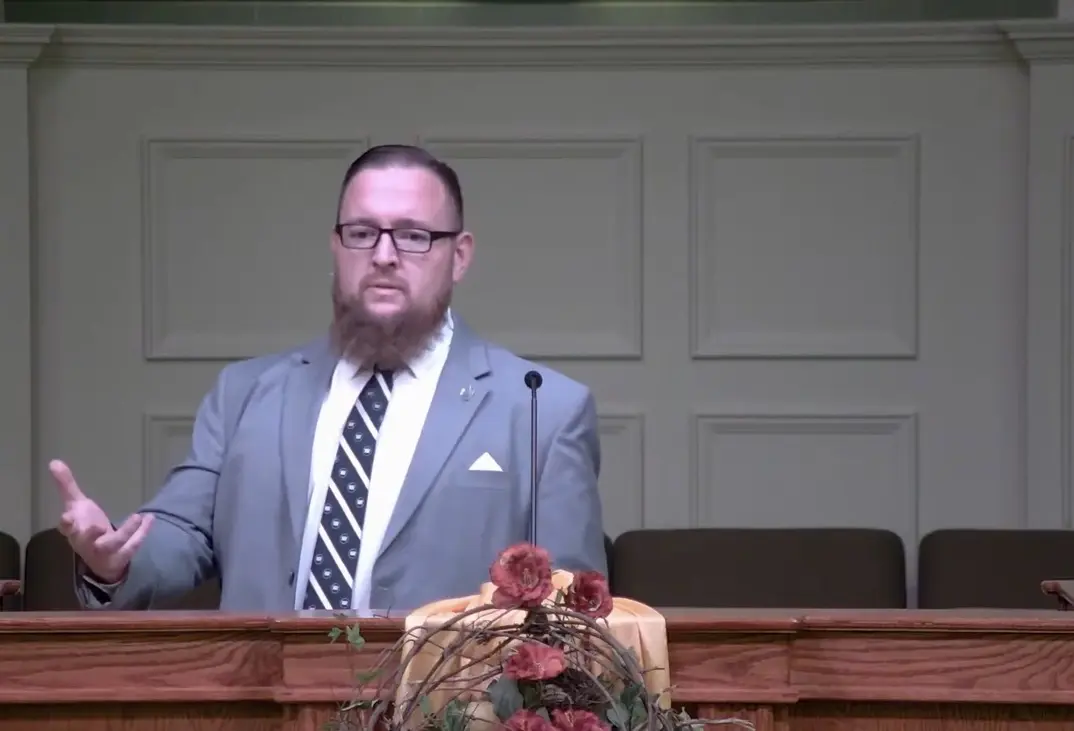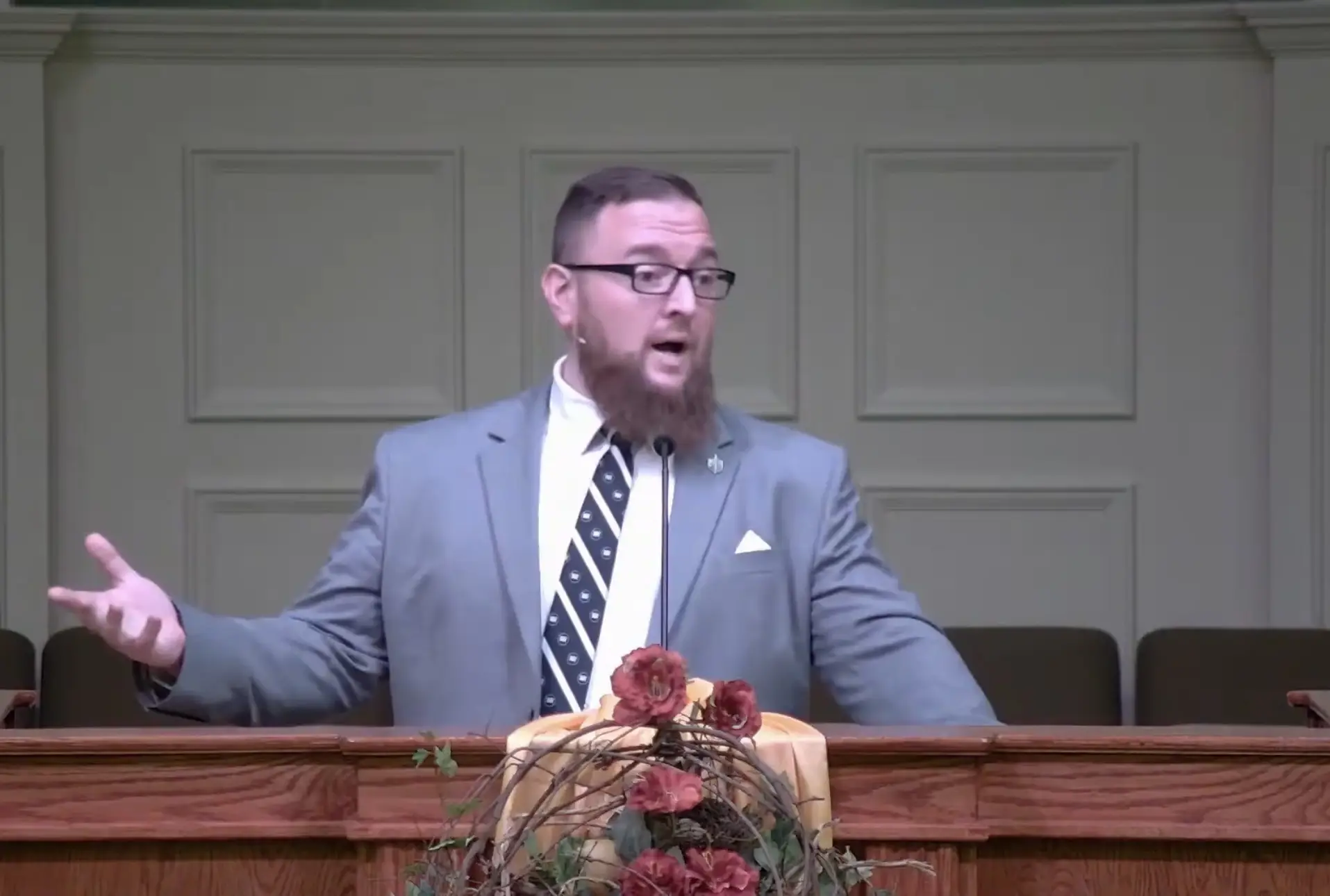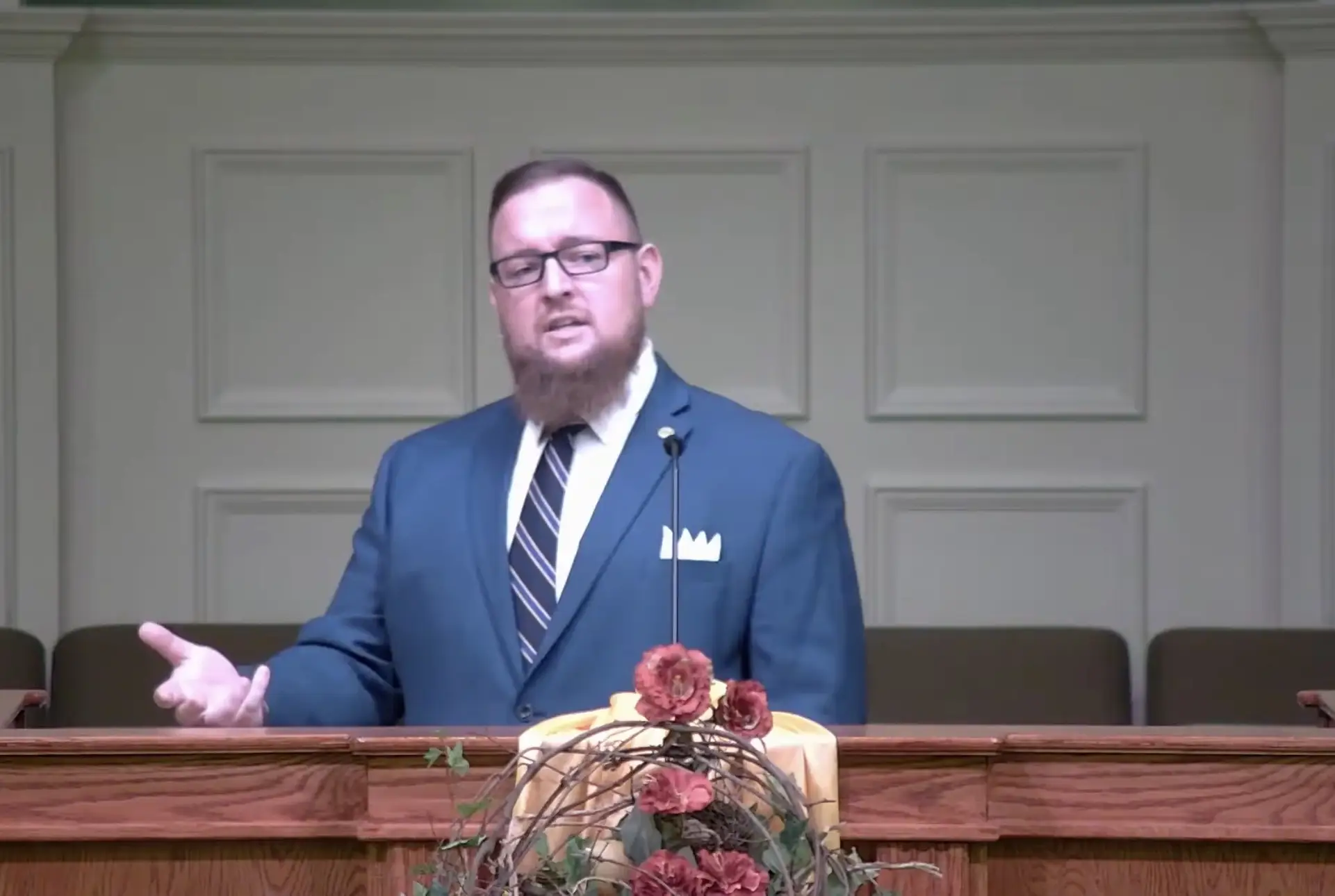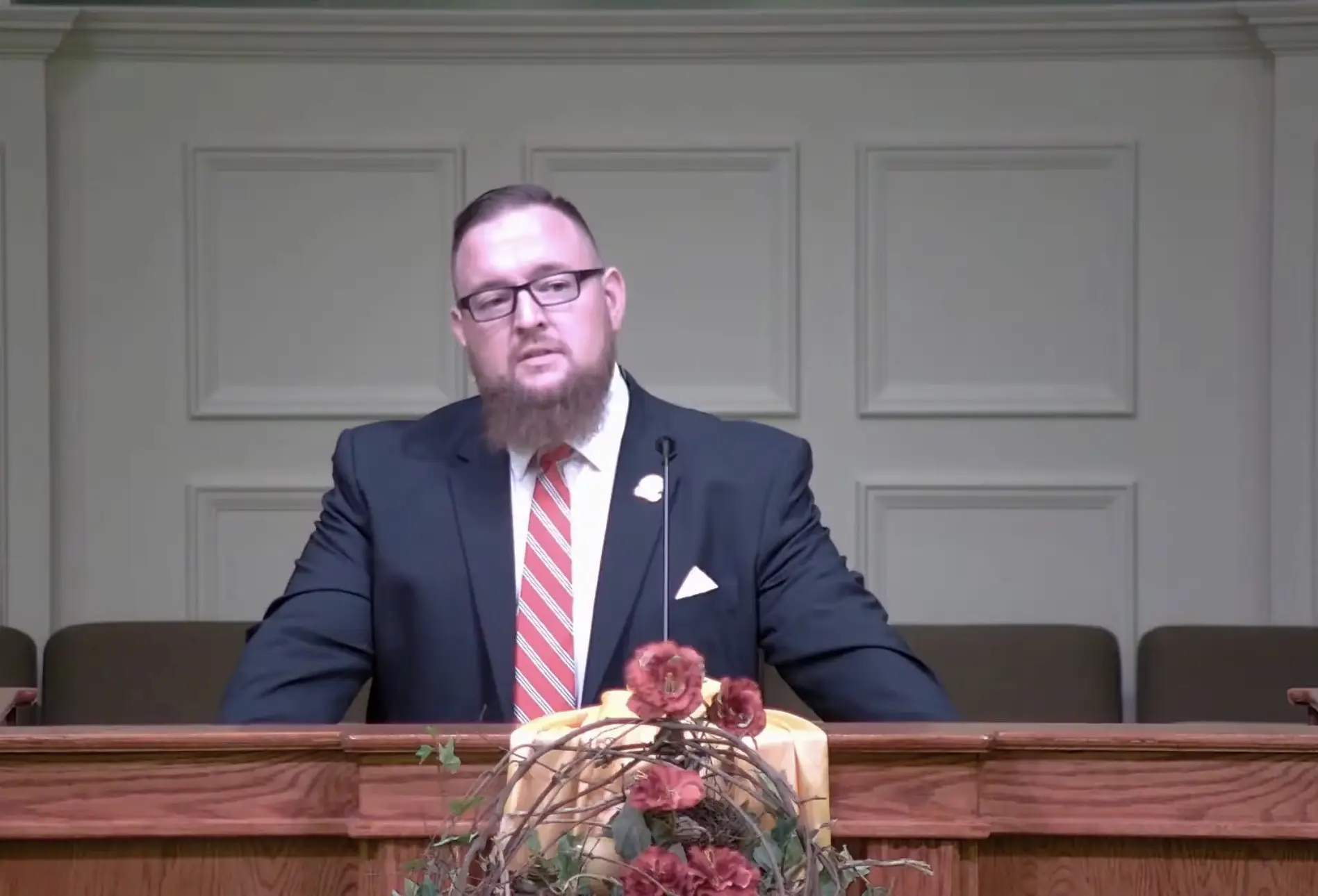Video
“In the Beginning”
John 1:1-2
Pastor Ryan J. McKeen
01/12/25
Audio
Transcript
Well, turn with me in your Bibles to the Gospel of John, to the very beginning of the Gospel of John. John chapter 1.
Last week we briefly introduced this book, and we talked about several of the preliminary issues that you need to understand before we can really study a book like this. And we talked about several of those things. We talked about how it is the Apostle John, the brother of James, the son of Zebedee and Salome who wrote this book. And we talked about who John was. He was the beloved disciple. The beloved elder in the early church.
And we know from church history that he was a man who spent most of the latter half of his life in the region of Ephesus, where he was a pastor and he was a leader, and he wrote this gospel in three letters, and then later on wrote the book of Revelation. We also talked about the purpose that John had in writing this book. And that purpose is found near the end of the book in John chapter 20, verse 31, where he says that these, these things he’s written in this book, these have been written so that you may believe that Jesus is the Christ, the Son of God, and that believing you may have life in his name. That is what John wants you to get from this gospel. that Jesus is the Christ, the Son of God, and that believing, you may have life in his name.
John wants us to know Jesus and to be saved by knowing him, which means that a central question that we need to consider every time we open the Gospel of John is who is Jesus? What do you think of Jesus? Who is he? And this is the most important question that you or anyone else will ever face. Who is Jesus? It’s an inescapable question. Every person who ever lived in this world will face that question one way or another. That question will determine what kind of life you live on this earth. And more importantly, that question will determine where you will spend eternity.
James Montgomery Boice, the great pastor and preacher, he explained it this way. If he, meaning Christ, if he was only a man, then you can safely forget about him. But if he is God, as he claimed to be, and as all Christians believe, then you should yield your life to him. You should worship and serve him faithfully. So who is Jesus? Who do you say that he is? That’s John’s purpose. And that’s the point he intends to drive you to as you read the Gospel of John.
And here at the very beginning of John, we see John’s thesis. A thesis is a condensed summary statement of what the whole book is about. For example, when you write an academic paper, whether it’s in college or seminary or things like that, which I’ve had to do many, many times, one of the things that determines the quality of your paper is your thesis statement. And that is generally right within the first paragraph that you write. I’ve had professors say that I should be able to understand your whole paper by reading the first paragraph. That should tell me everything I need to know. And so you write your thesis in the beginning of the paper and you’re saying, this is what I’m going to prove to you. And then later on, at the end of your paper, you conclude it, and you summarize it, and you say, see, this is what I was going to tell you, or prove to you, and this is how I’ve done it. And that’s what John does. And in the opening pages of John’s gospel, we see his thesis statement.
And that’s verses one through five. Verses one through 18, which I read earlier, is his prologue, or introduction. He introduces a lot of different things that are gonna be found in the gospel. But the first five verses are a summary of the whole book. This is what he’s writing to tell us. These five verses are really some of the most condensed, rich theology in all of Scripture. John literally packs theology and meaning into every single word of these five verses. And we’ll study this text this morning as a whole, verses one through five, because they really all go together, but we won’t finish all five verses this morning. There’s really no way.
As I was studying and putting my thoughts together on this passage, I had a good amount together, what I typically have for a sermon, and I was feeling pretty comfortable with it, and then I realized I’m only at the end of verse two. Then you get to three, four, and five, and there’s even more. So there’s no way that I’m getting through one through five all in one sermon. But as we study this, we need to realize that it is all one unit. And they all go together. And really, the points that I’ll have for this text all go together. And we’ll really have four points, and hopefully we’ll get through the first two or three verses today. We’ll see how far we get. But we’ll finish these thoughts in a few weeks when we come back to the Gospel of John.
But that’s how we’ll look at this text. It’s all one. The first five verses are all really one continuous thought. And there’s some really, as I said, major doctrines of theology here. And that’s how we’ll organize this text a little bit, the doctrines that stick out to us. And really some significant areas of what we call Christology, which is the study of Christ, who he is and what he’s done. And we’ll look at that as we go through this text. And what we’ll see, just to kind of give you a roadmap of how we’re gonna go through these first five verses, is first of all, the preexistence of Christ, and I’ll explain what that means, but the preexistence of Christ, and that’s in verses one and two. In verse three, we see the power of Christ. Verse four, we’ll see the self-existence of Christ. And point four, or heading four, will be the mission of Christ, and that’s found in verse five. And again, we’ll begin and hopefully get through the first two points, maybe, we’ll see. But then we’ll finish this here in a few weeks.
And that’s where we’re going with this thesis statement of John, this first five verses of his introduction to the gospel of John. And it really sets the stage for who it is John is writing about. Begins to introduce to us this person that John wants us to know. So let me read the text this morning, verses one through five of John chapter one. John one, one through five. This is the word of the Lord. In the beginning was the word, and the word was with God, and the word was God. He was in the beginning with God. All things came into being through him, and apart from him, nothing came into being that has come into being. in him was life, and the life was the light of men. And the light shines in the darkness, and the darkness did not overtake him.”
So again, we begin here with the pre-existence of Christ. Pre-existence. He existed before. That’s what that word means. And as I said, every single word of this passage is packed with significant meaning and some theological depth that we really need to understand in order to understand what John is talking about. And really the most important word in this whole section, and it’s repeated here, is the word word. And to understand what John’s talking about, we need to understand what he means by the word. We see this repeated here in the first few verses, but we see it again in John 14, where we find out who the word is. John 1.14 says, and the word became flesh and dwelt among us. And we beheld his glory, glory as of the only begotten from the Father, full of grace and truth.
So the word is the one who came, who became flesh, he came from the Father, he has the same glory as the Father, and he’s full of grace and truth. And then in verse 17, John finally reveals for us who exactly it is. And he says, for the law was given through Moses, but grace and truth came through Jesus Christ. Jesus Christ. So this whole long introduction, he doesn’t even get to the name of the one he’s talking about until verse 17, because he’s got so much to tell us about who this is before he gets to his name. So the word here is Christ. We follow the logic through the passage and the word he’s talking about is revealed as Jesus Christ, the one who became flesh. The one who became what he was not before without actually changing what he was. That’s who the word is.
But why does John use the word word? It would be so much clearer if he just began with his name. What’s he doing here by using word to refer to Christ? Well, he uses the word word because it’s a fitting way to explain or describe what Christ was supernaturally or before He took on flesh. We know He is the Son. He’s not the father, he’s not the spirit, yet all three are equally God. But as you see in John’s context, in his day, he lived in a Greek culture. And there was a philosophical understanding of this term, the word word, and that was the Greek word for logos. The Greek word logos, we translate into the word word, but it really has a much fuller meaning than just simply the word word. There’s a lot more going on here. So I need you to follow me a little bit as we kind of trace this and come to an understanding of what John is getting at here and why he would use this in his very first verse to describe who Christ is.
But this word logos. That’s the term we see here in the text several times. And to the Greek philosophers, in his context, the Greek philosophers saw that the logos was this impersonal and abstract principle of reason and order in the universe. It’s where we get the word logic from. So the idea of something being logical, that it’s logic, that is what they had in mind with this word Lagos. And sometimes they talked about this Lagos as being the creative force. And it was the source of all wisdom. And again, these philosophers, they talked about this Logos as an invisible reality that was visible in the world. So I know this is very cerebral, and it’s hard to kind of see why this is important. But as you think about this philosophical meaning, now the average Greek in that day didn’t understand all of the nuances of it. But they knew that the term logos was important, and it was one of the most important principles in the universe. So you’re talking about unbelievers, and this is what they think of when they hear the word logos. You remember, John’s writing to convince you who Christ is. So he’s writing so that unbelievers would believe.
And what John’s doing here using this word is similar to what Paul did in Acts 17 in Athens. And as Paul is speaking to the Greeks in Athens, in Acts 17, verses 23 and 24, he says this, for while I was passing through and examining the objects of your worship, I also found an altar with this inscription, to an unknown God. Therefore, what you worship in ignorance, this I proclaim to you, the God who made the world and all things in it, since he is Lord of heaven and earth, does not dwell in temples made with hands. He’s coming to them contextually where they’re at and helping them see who God is, who Christ is. And John is doing something similar. He’s using the idea that they understand and he’s showing them what you’re really wanting to see here is only found in Christ. So to the Greeks, John was presenting Jesus as this embodiment, this personification of their idea of the logos, the logic, the creative power in the world. He’s saying, this is Christ. Christ is the one who is all wisdom and who is the creative power in the world.
But it’s not only that. He’s not only speaking to the Greeks here. This was an important concept in a Jewish context as well. Logos was not just a Greek concept, but as we translated into the word word, the word of the Lord was a massively important idea for the Jews who knew their Old Testament well. So as the Greeks read this, they have a concept that they’re coming from, but the Jews have another idea. And when they see the word, in the beginning was the word, and later on the word became flesh. When they hear the word, they’re thinking the word of the Lord. The word of the Lord was the expression of God’s power and his wisdom.
The word of the Lord was how God reveals himself to mankind. And you see this all the way back to the beginning of the Israelites with their father, Abraham. When God comes to Abraham and makes his covenant with Abraham, his eternal covenant that you’re going to be the father of my people. Genesis chapter 15 verse 1 says this, after these things, the word of Yahweh or the word of the Lord came to Abraham in a vision. So this initiation of the nation of Israel came by the word, the word of the Lord. And we see this over and over throughout the Old Testament. The word of the Lord came to so-and-so. The word of the Lord came to this one or that one.
Men like Moses, Samuel, David, Solomon, Eli, Elijah, all of these men have an instance where the word of the Lord came to them. And over and over and over, the Jews read, the word of the Lord came. And now John tells them that the word of the Lord that has always come to guide us and to save us, that word that came to us from God, often in audible form and then in written form, that word has now become flesh. He has come in the flesh. The Word became flesh and dwelt among us. So John is revealing to his Jewish readers Jesus as the incarnation, the in-flesh reality of God’s power and revelation. In that same Word of the Lord, which through which God did all these things in the Old Testament, he is now doing in the flesh of Jesus Christ.
And we see this clearly in the book of Hebrews. If you could turn over, you can keep your finger in John, but if you could turn over to the book of Hebrews quickly, chapter one, verses one and two, you see really an explanation of what John says here. And it’s interesting, Hebrews is a sermon that was recorded. And at the very beginning here, it’s almost like he’s preaching on John chapter one, verse one and verse 14. What does it mean that the word became flesh? He says that the author of Hebrews in Hebrews one, verses one and two says this, God, having spoken long ago to the fathers in the prophets in many portions and in many ways in these last days spoke to us through his son, whom he appointed heir of all things, through whom he also made the world. So this word, the word God spoke, he spoke to us, to the fathers and through the prophets, that’s originally how his word came to us, but now he spoke to us, his word came to us in his son.
This is John 1:1. This is the word. This is why John is using this word to explain who Christ is. As the incarnate word, the word in the flesh. Jesus Christ is God’s final word to his people. And all of that meaning, the significance to the Greeks of his day, and the significance to the Jews of his day, all of that is packed into this one word, the word, logos. That’s what he means. And that’s an important issue that we need to get settled before we can really work through this text. That’s what’s packed into that word, word, the word. So let’s start back at the beginning of verse one. And again, this is under the heading of the pre-existence of God, or of Christ, sorry, the pre-existence of Christ.
So it begins, in the beginning. John one, verse one, in the beginning. And in the beginning, that phrase immediately reminds us of something. It reminds us of how the Bible starts. In the Old Testament, Genesis chapter one, verse one. In the beginning, God created the heavens and the earth. Genesis begins with creation. And in a few verses, John will refer to creation. But both in Genesis and here, this context shows that the beginning is the beginning of all things. The beginning of the universe. The beginning of time. Do you ever think about that? Before the beginning that’s talked about here, there was no time. Time did not exist. God existed. And when he created, that’s when time begins. But he was before time. He’s outside of time. And that’s more than we’re gonna get into today because that’s just, that’ll blow your mind if you think about it too much. But time begins at the beginning. The beginning of matter, everything that’s material began at this beginning. The beginning of everything that is, except for God himself. That’s the beginning that we’re talking about here.
And this word beginning, the word that it comes from, it means origin. And that makes sense. It’s where everything comes from. It’s the time that everything happened. Everything started. This is the point in time John is talking about. And he says, in the beginning was the word. Another interesting tie to this phrase is from the beginning of the gospel of Mark. And in Mark chapter one, verse one, Mark begins his gospel by saying, the beginning of the gospel of Jesus Christ, the Son of God. Now, what Mark means is this is where I’m gonna start the story of Jesus Christ. This is who he is, he is the gospel, he is the good news, and this is where I’m starting. And if you know Mark, he starts right with the adult life of Jesus. And we know fairly confidently that Mark’s gospel was the first one written, that Mark wrote about Jesus first. And so there’s a good possibility that John is making an allusion as one of the gospel accounts. A lot of people probably already had Mark.
And so John could be saying, Mark told you about the beginning of Jesus’ ministry. But what I want to show you is that the gospel traces back even farther than that. The gospel traces back to the beginning of everything. Not just the beginning of Jesus’ life, the beginning of everything. So John starts with, in the beginning. In the beginning was the Word. We already discussed the Word is Jesus Christ. The Word is Jesus before he became Jesus. And John says, in the beginning he was. In the beginning, He was. He already was there. Jesus Christ was already in existence when the heavens and the earth were created, when time began, when everything material came to be. He already was. He is not a created being. He existed from all eternity. The Logos, the Word, Christ, He did not begin to be. He already was.
And that’s a hard concept for us to think about because everything we know and see and touch and everything in our frame of reference started somewhere. Even if it was before us, we know that everything started somewhere, except for God. God did not come to be at any point. He was. In the beginning, the Word already existed. The word is before time, he is eternal. And this word here that we’re looking at, the word was, it’s in the imperfect tense, which even the way that John wrote this word, in the tense that he used, teaches us something. Because the imperfect tense is used to describe a continuing action, something that is continually going on. So even the way that John chose to write this little word tells us of the pre-existence of Christ. It tells us he was continually in existence before the beginning.
I’ll help you understand this by just showing you, you could say this as in the beginning always was the word. He always was. And throughout the Gospel of John, you see, this is the being verb. So, to be, is, was, all those forms of this being verb. Throughout the Gospel of John, Jesus uses another form of it. He says, I am. I am. Many times, he is the I am. He is all these different I am statements that we’ll see as we go through, whether it’s the good shepherd or I am the door, I am the way, I am the truth. All the I am statements is a form of this word.
In John 8:58, Jesus said to them, truly, truly, I say to you before Abraham was, I am. Before Abraham was. There was a time when Abraham wasn’t. There was a time before Abraham came to be. There is no time before Christ came to be. He always was. Before Abraham was, Jesus was. Before everything was, Jesus always was. And even more significant than all of that is the contrast you see here in this whole passage. Because he uses the word was to speak about Christ, but then he continues to use the word became or came into being. You see that in verses three, 10, 12, and 14, the phrase came into being. And if John had used came into being to refer to Christ, there would be a time when he wasn’t. But the word was, in contrast to came into being, proves to us. He never came into being. Everything else did.
There was never a point when he came into being, because he always was. Which makes it even more incredible that he became flesh. The word that always was became flesh. And he dwelt among us. It’s just incredible to think about the one who never came to be one day came to be flesh. in the beginning was the Word. This is the pre-existence of Christ. He always was. He pre-exists everything. He exists before everything that is. And that’s the first phrase of our text. And then John takes his argument a step further. So not only did He exist before the beginning, the Word was with God. In the beginning was the Word, and the Word was with God. Not only has He always existed, He always existed with God.
And you may think, well, I thought He was God. Just a minute, we’ll get there. He is God, and that’s the next phrase. But this phrase tells us He isn’t the only person who was preexistent. There’s more than one. This Greek expression that means with God, proston theon, you might have heard that before from other preachers or theologians, a very significant expression. We translate it in just about every version I’ve seen as with God. But it doesn’t fully communicate all that’s there in that expression. Because the more you study this, as one Greek scholar explains this phrase, he says, it gives the picture of two personal beings facing one another and engaged in intelligent discourse. Every other time in the New Testament when pros ton is used, it’s two people face-to-face talking with one another. And so theon means God, so pros ton theon tells us that the Word was not only with God, but there’s a intimate, personal, face-to-face relationship there.
So instead of with, you could say He was face-to-face with God. In the beginning was the Word, and the Word was face-to-face with God. I know it blows your mind to think about it. But it makes a little more sense of some other passages of scripture for us. It makes a little more sense of the mystery of the incarnation. A passage like Philippians 2. Starting with verse six says, who, meaning Christ, who although existing in the form of God, that’s this proston idea, this face-to-faceness with God. Although he existed face-to-face with God, he did not regard that, that equality with God, that face-to-faceness, as a thing to be grasped. But he emptied himself. by taking the form of a slave, by being made in the likeness of men, being found in appearance as a man. He humbled himself by becoming obedient to the point of death, even a death on a cross, in the form of God, or in that face-to-faceness with God.
But he emptied himself. We spoke on this passage earlier this, or last year. But what did he empty himself of? Well, it couldn’t be anything that makes him God, otherwise he could not be God with us. And he couldn’t be the fullness of God dwelling bodily, as we see in Colossians 1. So how did he empty himself? By taking the form of a slave. He took on a form he did not have before. He took on a form other than the face-to-face relationship he had with God, the Father. He didn’t have to do any of that. He could have stayed face-to-face with God forever. But he took on flesh. so that he could redeem flesh.
He came and bore our sins on the cross. Why? So that one day his people could have that face-to-face with God that he always had. That’s the gospel. And the only way to come into that face-to-face relationship, when we will see Him as He is, and we will be like Him, the only way to do that is through Christ. John 14:6 tells us that no one comes to the Father except through Christ. That face-to-face relationship is with the Father, and you’re not getting there unless you come through Christ. If you have not come to Christ, you need to come to Him today. You need to confess that you’re a sinner, that you are one that He came for, sinners, and that you need Christ to save you from your sin, and He will. And then you can look forward to that day when we will be what He always was, face to face with God.
So the Word was with God. And then if that wasn’t enough, John takes us another step. So in the beginning was the Word, and the Word was with God or was face to face with God. And not only that, the Word was God. The Word was God. John’s description of this Word reaches its pinnacle in the third phrase. He’s like taking us up a flight of stairs. Not only did the Word exist from all eternity, and not only did He have a face-to-face fellowship with God, the Father, but the Word was God. That statement is four words in English and in Greek, four words. But it might be the most clear and direct statement of the deity of Christ in all of Scripture. Jesus is the Word. The word is God. Therefore, Jesus is God.
And this can only be true, this verse, can only be true within a Trinitarian framework. It’s only true if you believe in the Trinity. Otherwise, this is logically absurd. You’re saying two different things that can’t be true at the same time. You can’t be with someone and be that someone unless you believe in the Trinity. You can’t be with God and be God at the same time unless there are three who are God and there’s one God. This is proof that Jesus is God and it’s proof of the Trinity in four words.
Now there are false religions that deny the Trinity, that will deny that this is what these verses say. In fact, the Jehovah’s Witness Bible changes this translation to, he was a God. They say, in the beginning was the Word, and the Word was with God, and the Word was a God. That’s how they translate it. And they say they do that because the word there for God doesn’t have an article in Greek, which basically means it’s indefinite. So it’s all vocabulary words or grammar words to say, it should have a the with it, if it’s definite, if you’re speaking about only one. But that’s just not the way Greek works. All that to say, sometimes it’s just written that way. and their translation is not accurate.
In fact, that’s the way the word God appears several other times in this passage, and they don’t translate it that way. They don’t say a God any of these other times, and I’ll show you. Verse six, there is a man having been sent from God whose name was John. It’s the exact same form you find in verse one of the word God there. But they don’t say, John was sent from a God, it’s God. John was sent from God. Another one is verse 12. But as many as received him, to them he gave the right to become children of God. Again, same formula, but they don’t say a God, it’s God. Same in verse 13. who were born out of blood, nor of the will of the flesh, nor of the will of man, but of God.” Verse 18, no one has seen God at any time. All the same construction, and yet in the verse that proves that Jesus is God, those who deny Jesus as God change the translation. Their argument falls flat. The Jehovah’s Witness translation of John 1 is a phony and false translation. It denies Christ, and it denies God, and it reveals the damnation of Jehovah’s Witnesses.
In the beginning was the Word, and the Word was with God, and the Word was God. And just to emphasize the significance of everything that’s in verse one, in verse two John restates it. Verse two says, he was in the beginning with God. He emphasizes again the eternity of the word. The pre-existence of the word. He was already in existence. He was in the beginning with God. And as John noted in verse one, this existence was face to face with the Father.
So this is point one of this text. And that’s all we’re gonna get to today. But this doctrine in these two verses is essential, essential to the deity of Christ, that Jesus is God. It’s essential to what it means to be a Christian. The very point that John is writing to prove that you may believe that Jesus is the Christ, the Son of God, and that by believing you have life in his name. You can’t miss verse one. That’s who he is. The truth of Jesus Christ’s deity and full equality with the Father. That they are one God, yet they are distinct persons. That is a non-negotiable piece of the Christian faith. You must know who Jesus is. And you must have the right Jesus. the Jesus of the Bible, the Jesus of John 1:1.
John tells us in his second letter, in 2 John that we studied last year, if anyone comes to you and does not bring this teaching, this teaching that John gave them in his gospel, if anyone comes and doesn’t bring this Jesus to you, do not receive him into your house and do not give him a greeting. He’s speaking in reference to these false teachers that were going around, teaching another Jesus. He says, you got to have this Jesus.
And likewise, Paul in Galatians chapter one, verses eight and nine. He says, even if we or an angel from heaven, shout out to the Mormons, an angel from heaven gives you another gospel contrary to the gospel we have proclaimed to you, let him be accursed. As we have said before, so I again say now, if any man is proclaiming to you a gospel contrary to what you received, let him be accursed. That word accursed means damned to hell. You get Jesus wrong, you get it all wrong. You get Jesus wrong and you are accursed. You’ve got to get him right.
Jesus Christ is the eternally preexistent word. In the beginning was the word. He’s the creator of all things. We’ll see that next time. And he himself is God. He enjoys face-to-face communion with God and he is God. And He came and He took on flesh so that He could save His people from their sins. If you trust in Christ as your Savior, He came for you. But if you do not yet trust Christ, you need to come to Him today. Trust in who He is and what He’s done. and trust that He alone is the answer for your sin problem, and live to serve Him as your Lord. We’ll stop here for today, and we’ll pick up with point number two in a few weeks.
Let’s stand, if you’re able, and close in a word of prayer. God, we thank You for this incredible passage of scripture, it’s unbelievable how deep and unfathomable these few verses are. But we thank you for who you are revealed to us in these passages, in these few verses. We thank you for what you’ve done in sending your son, who you eternally had face-to-face communion with, sending him to take on flesh, and to deliver his people from their sins. We thank you for who you are. We thank you for your word, for revealing yourself to us in your written word and in your son. God, we praise you and glorify you in all that we do. We thank you for what you’ve done for us, and we pray this in Christ’s precious name, amen.
